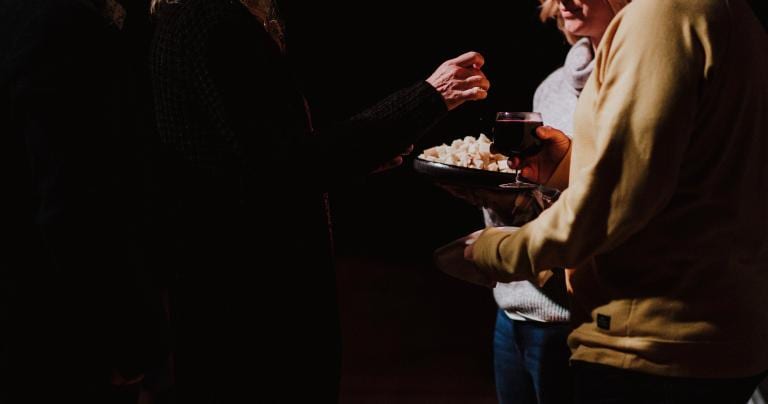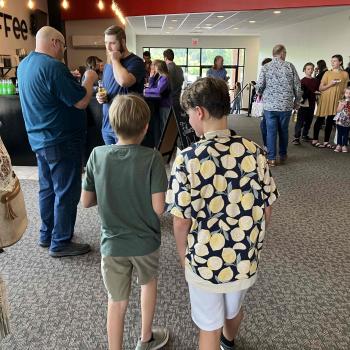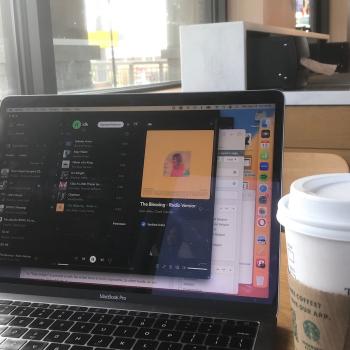
Communion, pt. 6 | Early Influences, Irenaeus and Hippolytus
For more on Communion in the Early Church from the Archives CLICK
Irenaeus of Lyons
Irenaeus of Lyons is discipled by Polycarp, who is discipled by John.
He is a Presbyter in Gaul {France} around 177 and eventually Bishop after a persecution claims the life of the presiding Bishop.[1] He writes in Greek and influences both East and West churches, but especially the East.
“Some Eastern Orthodox theologians aver that all of theology is but a series of footnotes to Irenaeus.”[2]
He teaches on the Eucharist around A.D. 185 in his work Against the Heresies. He sees the Eucharist as a thanksgiving offering to the Creator, a firstfruits. He asks:
“How will they allow that the bread over which thanksgiving has been said is the body of their Lord, and that the chalice is the chalice of his blood, if they say that he is not the son of the creator of the world; that is to say, his Word through whom the tree bears fruit and the fountains flow and the earth yields first the blade, then the ear, then the full corn in the ear?”[3]
Is Irenaeus saying that Jesus is both Creator, and Re-Creator through the Eucharist? This seems to be a true Eucharist {giving thanks}. He says that in the Eucharist, the Lord is:
“Instructing His disciples to offer to God the first-fruits of His own creation, not as though He had need of them, but that they themselves might be neither unfruitful nor grateful.”[4]
The Eucharist keeps the Primitive Church in check, as they regularly present offerings in gratitude for His work on the cross. So it is to Christ that they present their first-fruits {He who is the first-fruits of the new creation} when their laymen present the elements for the Eucharist.
oblation
Irenaeus uses the term oblation or offering, and there seems to be two sides to it.
First Christ offers his body and blood, symbolized in the bread and the wine, “the first-fruits of His own gifts in the New Covenant.”[5] Christ gives to us.
Second, “the church learning by tradition from the apostles, throughout all the world she offers to God.”[6] We give to Christ.
Irenaeus repeats, “We ought to make oblation . . . offering firstfruits . . . offer unto Him what is His own.”[7] In this way we’re participating in some mysterious way in Christ’s sacrifice. Dom Gregory Dix calls this an old theme with, “an emphasis on an authentic strain of primitive tradition.”[8]
mystery
Irenaeus explains that there is a mystery in communion, in the prayer, that changes its meaning and our reception of it. He writes:
“For as the bread of the earth, receiving the invocation of God, is no longer common bread but Eucharist, consisting of two things, an earthly and a heavenly; so also our bodies, partaking of the Eucharist, are no longer corruptible, having the hope of eternal resurrection.”[9]
This is at the least a mystery or true blessing. Part of that mystery is not only recalling, but forward looking, eschatological.
Hippolytus, The Apostolic Tradition
Hippolytus arises in the late second century in Rome, writes in Greek, is influenced by Irenaeus, and is an influence on both East and West. He states about the offertory:
“To (the bishop) then let the deacons bring up the oblation (prosphora), and he with all the presbyters laying his hand on the oblation shall say ‘eucharistising’ thus . . .”[10]
The offertory is an oblation or sacrifice before it is consecrated revealing a primitive view of Eucharist as offering.
Hippolytus says the Bishop begins the prayer, “Let us give thanks (lit. make eucharist) unto the Lord.”[11]
Dom Gregory Dix says that Hippolytus’ prayer is, “clearly derived from the invitation of the president of the chaburah before reciting the berakah after supper and the ‘assent’ of his company.”[12]
Robert Webber agrees that the prayer is like a, “Jewish Berakhah – praise, historical recitation, and petition.”[13]
In this way, it is linked to this ancient thanksgiving prayer.
Bard Thompson reviews the epiklesis as penned by Hippolytus:
“Unlike the epiclesis in the later Greek rite, it did not make reference to the conversion of the elements; rather it asked that the Holy Spirit descending ‘upon the oblation of Holy Church,’ would work effectively in the hearts of the communicants.”[14]
transformation in the interior life
For Hippolytus, the transformation occurs in the hearts of the believers who are receiving Eucharist, rather than in the elements. Here is the epiklesis:
“And we pray Thee that [Thou wouldest send Thy Holy Spirit upon the oblation of Thy holy Church] Thou wouldest grant to all [Thy saints] who partake to be united [to Thee] that they may be fulfilled with the Holy Spirit for the confirmation of [their] faith in truth.”[15]
Although this is the epiklesis presented, Bishops retain the right to pray their own prayers at this point in the Early Church and to pray extemporaneously. Bishops also pray in the Holy Spirit, and that is what Paul addresses in 1 Corinthians 14.16.[16]
For more on Communion in the Early Church from the Archives CLICK
pic credit: Priscilla Du Preez | A person takes communion at a Christian church service | 11.15.18 | unsplash
notes:
[1] Pope Benedict XVI, The Fathers of the Church: From Clement of Rome to Augustine of Hippo (Grand Rapids, MI: Wm. B. Eerdmans, 2009), 14.
[2] Roger E. Olson, The Story of Christian Theology: Twenty Centuries of Tradition and Reform (Downers Grove, Il: IVP Academic, 1999), 69.
[3] Henry Bettenson and Chris Maunder, eds., Documents of the Christian Church, 4th ed. (New York: Oxford University Press, 2011), 79.
[4-8] Dom Gregory Dix, The Shape of the Liturgy, 3rd ed. (London: Bloomsbury T&T Clark, 2015), 113, 114, 113, 114, 114.
[9] Bettenson and Maunder, 80.
[10-12] Dix, 110, 127, 127.
[13] Robert E. Webber, Worship Old and New: A Biblical, Historical, and Practical Introduction, Rev. ed. (Grand Rapids, MI: Zondervan, 1994), 240.
[14-15] Bard Thompson, ed., Liturgies of the Western Church (Philadelphia, PA: Fortress Press, 1980), 18, 21.
[16] Dix, 128.












